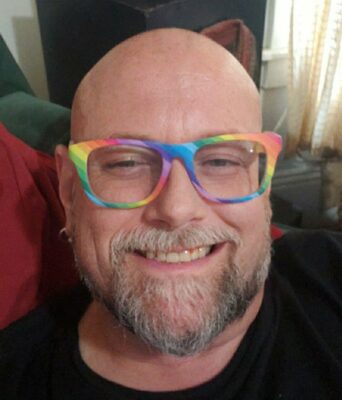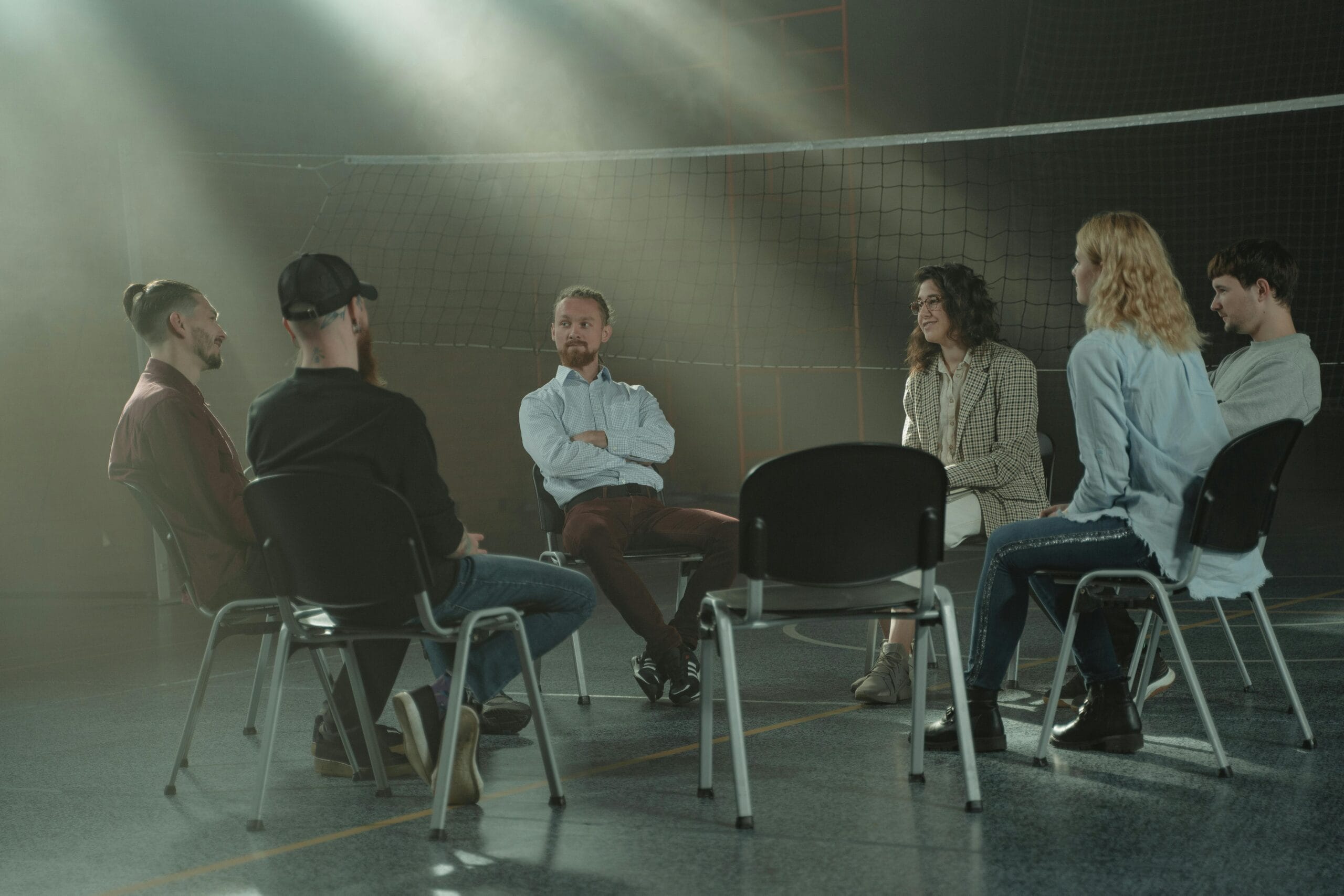Pineapple Daisies to Peer Provider
This powerful story recounts a journey from a desperate mental health crisis to a fulfilling career in peer support. Diagnosed with cancer, aids, and hepatitis C after 18 years of meth use, Greg felt like a shell of a person. He found comfort in rooms of recovery where people had stories that resonated with his, awakening both a sense of purpose and a new beginning.

Story
The last time I had been 5150’ed—the California law code used for the temporary and involuntary psychiatric hospitalization of someone who is thought to be a danger to themselves or others while experiencing a mental health crisis—I was laying on a mat in the San Francisco general psych ward ruminating on the looks on my dogs faces as I was in the middle of my second attempt to take my own life. Had they known the truth, they probably would have been less excited to see me moving about with such intention. I thought about how only a short time earlier I had reached out to my therapist as I aborted my first suicide attempt. Why did I call my therapist? Why leave a message confessing my plan? Why did I answer the phone when she called back? What the hell was wrong with me? The familiar chorus of self-loathing insults were on blast. I closed my eyes. Everything seemed to go silent. My thoughts became crystal clear. I was really going to die by suicide some day soon if I didn’t get help.
I feared the last thought my parents were going to have with their dying breath would be about me. The thought of their despair was too much. I had worked through a lot of my childhood trauma. I knew my parents had done the best they could. While there wasn’t complete forgiveness, I didn’t have ill wishes for either of them. I became willing to get help for my mental health and substance use disorder, right then and there, with an epiphany in the psych ward.
I had to learn to take care of myself all over again.
That’s when all the real work began. Eighteen years of substance abuse had exacerbated my bipolar diagnosis leading to bouts of psychosis and hospitalizations. Daily meth use, full blown AIDS, cancer, and hepatitis C had ravaged my physical self. My limbs were scarred from IV drug use and the resulting abscesses and cellulitis. I had become a shell of a person. I felt alone, lost, and unable to function in society. I was scared. I had to learn to take care of myself all over again.
Over time, I got pill planners and relearned proper nutrition for what my body needed at 45+ years of age. Medication helped stabilize my mood and get some sleep, but it also made me put on weight. I soon outgrew the clothes I had; this happened again and again. I also had a lot of extra time on my hands but no money, so I had to sit with the feelings that were surfacing—feelings about how I really felt about myself, how much my heart ached from a lack of self love, and how I felt inferior intellectually. I joined the Crystal Meth Anonymous fellowship and Alcoholics Anonymous, and as time passed, I met others in the rooms of recovery who had also experienced mental health challenges. I talked about mental health with my psychologists, and I also read There Is Nothing Wrong with You by Cheri Huber. I discussed our family history openly with my parents and my sister, who was also dually diagnosed.

I started to become much more comfortable talking about my mental health, but I also began to experience stigma. Some people would be nice when we first met but became cold and standoffish once they learned I was bipolar. I also became very self-conscious of my weight. I isolated and spent most of my time alone as crippling social anxiety made it very difficult for me to make friends in the fellowship. However, I slowly noticed, listened to, and befriended others who I heard talking about personal mental health struggles in the rooms of recovery. They were the only people I felt comfortable with approaching and sharing with honestly. I began to realize that there was much more support and camaraderie among my peers. I reached out to private online support groups on Facebook for people with bipolar disorder and depression. I began to read as much as I could about my diagnosis and continued to learn about mental health.
I not only cared about others more, but my desire to give back to the community that I had torn through like a tornado became increasingly important to me.
As I slowly developed social ties, I also began to become more curious about the world outside in general. New things began to interest me, like LGBTQ history, and my love of different foods, arts and cultures resurfaced. I decided I wanted to make some extra money so I could afford to go out to eat sometimes, and I dreamed of once again traveling abroad. I hadn’t worked for over ten years and had no resume. I also wasn’t very confident in my physical or mental stamina. I went to the Positive Resource Center in San Francisco and got a job counselor. He helped me update my resume to fill in the large gaps in employment, and I ended up getting a part-time job with a fruit bouquet company called Edible Arrangements. Working there helped me to slowly regain my self-esteem. I began to see that I was just as valuable an employee as I had ever been, but that I had also gained a few things from my lived experiences with substance use disorder and bipolar 2. I had a newfound humility, a compassion and empathy for others that I didn’t recall having since I was a child. I not only cared about others more, but my desire to give back to the community that I had torn through like a tornado became increasingly important to me.
I became curious again about our society and the world at large. On top of all that, one of my fellows in recovery mentioned the RAMS Peer Specialist Mental Health Certificate Program and explained more to me about being a peer provider – how using my own lived experience to walk beside others who are trying to navigate their own paths to wellness and recovery was a valuable ability and skill that was in demand. I was accepted into the class and became engrossed with learning about the peer movement and topics like cultural humility and techniques like motivational interviewing, active listening, and W.R.A.P. I could not get enough; my mind was on fire and I realized that I had found my calling.

Working with those who are finding their way through childhood trauma and substance use disorder with co-occurring mental health challenges is the most interesting and rewarding work I have ever been involved in. I work for RAMs as a Peer Transition Specialist, and our program is part of the Peer Division. For about a year, we work one-on-one with clients referred to us by Intensive Care Management Clinicians who are stepping down to a lower-level of care, usually outpatient, to support them as they discover new resources in the community. While we are not responsible for outcomes, it is so rewarding to help others find their path to wellness and recovery. Having the support of and working with my fellow peer counselors makes the whole experience so enriching. My work is fulfilling, inspiring, challenging, and elating yet serious, heartbreaking, random, and complex all at the same time. Every case is different so it literally never gets boring – you can’t say that about cutting pineapple daisies! I was recently promoted to Senior Peer/Team Leader. I am also presently in the process of applying for graduate school to get my Master of Social Work. I know for certain that my lived experience with mental health and substance use disorder were without question the tools that life used to help me transform into someone who I love and respect—a kind and caring soul.
About the contributor
Gregory Broyles is originally from Pullman, Washington. He came to the San Francisco Bay Area in 1991. He currently works as a Peer Transition Specialist/Team Leader for Richmond Area Multi Services Peer Transition Team. He enjoys the rich culture and lifestyle of the Bay Area.